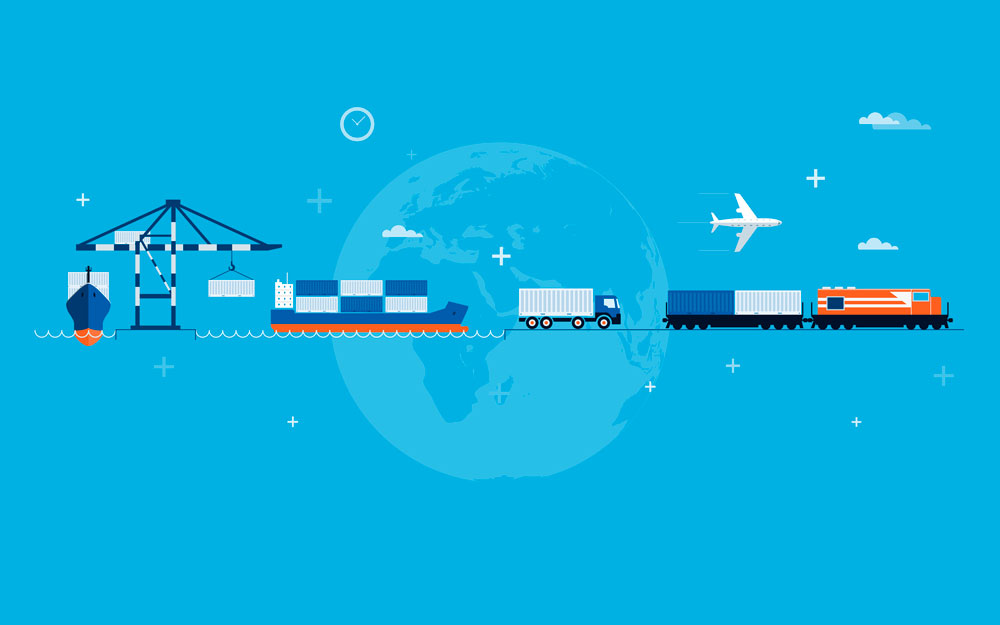
25 Mar The role of incoterms in International Trade
What are incoterms?
The incoterms or International Commercial Terms are terms that were established by the International Chamber of Commerce (ICC) in 1936. These terms are used in the process of buying and selling companies from different countries. The main purpose of incoterms is to simplify the development of trade, since it determines the point of delivery and the responsibilities that the importer and exporter must assume.
Additionally, the incoterms are reviewed and updated every ten years by the ICC, so after being in force since 2010, the list was renewed. In this moment, the list is divided into 11 incoterms, classified by the mode of transport, for any type of transport (EXW, FCA, CPT, CIP, DAP, DPU and DDP) and for maritime and river transport (FAS, FOB, CFR and CIF).
Learn a little more about each incoterm below:
Incoterms used for any mode of transport
- EXW (Ex Works): In this case, the importer must pick up the goods directly at the exporter’s establishment (usually a warehouse or factory), this produces less risk for the buyer, since he does not take care of the expenses, causing less risk.
- FCA (Free Carrier): The seller and buyer agree on a point, where the seller must always deliver the goods within the country of origin. The associated expenses are borne by the seller until collection.
- CPT (Carriage Paid To): The seller bears the cost of shipping to the country of destination or another agreed place. However, when the merchandise reaches the carrier, the risk is transferred to the buyer.
- CIP (Carriage and Insurance Paid): This incoterm is similar to the previous one (CPT), but the seller also pays for the insurance.
- DAP (Delivered at Place): In this case, the importer and exporter agree on a delivery point, where the exporter assumes the risk and all expenses until the importer picks up the goods. In addition, import costs are not included, which are paid by the importer.
- DPU (Delivered at Place Unloaded): This incoterm consists of the agreed place for the delivery of the goods (unloading included) is chosen by the importer. In addition, this should only be responsible for the payment of the import clearance, since the other expenses are the responsibility of the exporter.
- DDP (Delivered Duty Paid): This negotiation term is one of the preferred by the buyer, since the seller takes care of everything: unloading, transport, insurance and import.
Incoterms used for maritime and river transport
- FAS (Free Alongside Ship): This incoterm is commonly used for bulky or very bulky cargoes. The exporter is responsible for leaving the goods in the agreed port, next to the ship that will transport it.
- FOB (Free on Board): Definitely, this incoterm is one of the most used in trade by sea. In this case, the exporter moves the goods on board the ship and not only to leave it at the dock. It should be noted that this term does not apply to river transport.
- CFR (Cost and Freight): The transport costs, from the moment the merchandise is moved on the ship until the arrival ashore at the port of destination, it is the seller who pays all the expenses, except for the possible damages that the merchandise may suffer from the moment of shipment, which are assumed by the importer.
- CIF (Cost Insurance and Freight): This incoterm is similar to the CFR, since the exporter assumes all transport costs including insurance.
Conclusion
Finally, we can deduce that incoterms are essential for international trade, since it helps both the buyer and the seller to be informed of the responsibilities and obligations throughout the process, causing the import and export to be carried out in a fast, efficient and orderly manner.
References
BD Trans. (2020). Qué son los Incoterms y cuál es su significado. Extracted from https://www.bdtrans.es/es/blog/que-son-los-incoterms-y-cual-es-su-significado/ [Consulted: March 23, 2022]
Comercio y Aduanas. (2021). Incoterms 2021: cambios y tipos de Incoterms. Extracted from https://www.comercioyaduanas.com.mx/incoterms/incoterm/incoterms-2020/#fas [Consulted: March 23, 2022]
Trafimar. (2020). 11 siglas de los Incoterms 2020. Extracted from https://www.trafimar.com.mx/blog/11-siglas-de-los-incoterms-2020 [Consulted: March 23, 2022]
